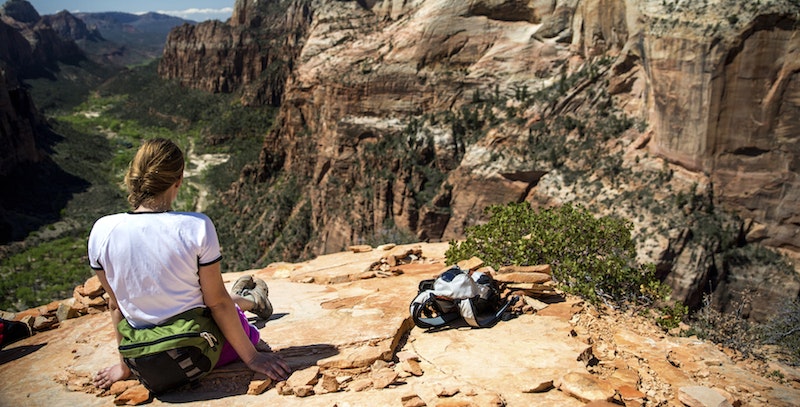My favorite way to enjoy the outdoors is spending the day at the beach. I grew up in South Florida, where it was never more than a 20-minute drive to the sound of lapping waves and the feeling of sand between my toes.
Since I moved away from home and my beloved Atlantic Ocean, I’ve found a bunch of new ways to connect with nature — water skiing on lakes, camping in national parks, and even hang gliding through tropical rainforests…if you can name it, I’ve probably tried it. These outings have been thrilling! But unlike a day at the beach, where you usually only fear a sunburn or possibly a jellyfish sting, some of these excursions have left me pretty banged up. And I was usually woefully unprepared to deal with how unpredictable nature can be.
The silver lining of years of mishaps, bumps, and bruises is that I’ve learned a thing or two about outdoor safety and first aid! Here are a few of the items I won’t leave home without. The best part is, you can fit most of them in a single zip-top bag if you buy travel-sized versions.
- Sun protection. Nothing is more annoying (or preventable) than a sunburn. Pack sunscreen that’s at least SPF 30 and preferably offers UVB and UVA protection. Toss a hat and sunglasses in your bag too. Learn more about ultraviolet and sun safety.
- Bug spray. All sorts of insects consider your body a moveable feast, and the best way to keep them away is with a bug spray. Products with 20 to 30 percent DEET last longer and will repel ticks and mosquitoes. Avoid combo sunscreen and bug repellents though; you can get too much DEET if you reapply often. Learn how to avoid Zika and mosquitos this year.
- Mini first aid kit. Accidents can happen, so pack what you need to clean and cover your wound until you get home to properly wash and dress it. You can pick these up at a drugstore or make your own with a few assorted bandages and alcohol swabs. I also recommend bringing a small supply of basic medications like aspirin or other pain pills, something like Dramamine for seasickness, hydrocortisone cream or antihistamines like Benadryl for allergic reactions, and tummy-calming medicines like Pepto Bismol or or Tums.
- Medication. Anytime you plan to get off the grid, make sure you pack at least one extra day's supply of any prescription medication (including your Epi-pens for allergies).
- Antibacterial gel. Soap and water is best for cleaning your hands before a meal or before tending a wound, but a source of clean water isn’t always available outdoors. A dime-sized amount of antibacterial gel will help keep germs at bay.
- Layers. Carrying a light jacket or scarf all day can be a pain, but you’ll thank me when you don’t shiver all the way back to the car because you just had to stay out and watch the sunset. Scarves can also be great for keeping the sun off your neck.
- Flashlight. Outdoor days can be so much fun that you lose track of time…and your keys…and now it’s dark, uh oh! But with your handy-dandy flashlight in tow, you’re equipped to locate lost items, signal for help, or light up the trail back to your RV in the dark. Those tiny LED ones that clip to your bag or jacket are especially handy.
- Portable phone charger. Often the point of heading into the wild is to unplug, but in the event of a real emergency (presuming you have cell service), you might need to make some phone calls. Unfortunately, Mother Nature does not provide electrical outlets, so bring a backup battery charger with you just in case.
The truth is, unless you plan to pack a full “man vs. wild” level survival kit or you are an emergency health care provider, you might run into situations that you can’t manage on your own outdoors. But with some thoughtful planning, you really can avoid — or at least minimize — many of the discomforts that nature inflicts.
In addition to these basic things, make sure you consider the special items that might be required based on where you’re going and who you’re going with. A picnic in the park will be a much simpler affair than wilderness backpacking trip to Alaska. So get ready — and get out there!
Natalie Lawson, RN, is a member of the clinical staff at Rally Health.
NATALIE LAWSON
Rally Health






